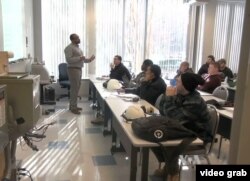Just outside Washington, D.C., future electrical workers are stooped over tables in a Lanham, Maryland, classroom — bending and cutting wires as they prepare to install switches.
Hands-on skills, apprentice Denise Long says, will serve her well when she is out on the job.
“What they teach you here, if you take it and keep the knowledge and retain it and use it, it will definitely make you a better worker. And also that increases your chance of keeping a job and everything,” Long said.
The 22-year-old was not sure what she wanted to do until she saw her older brother go through an apprenticeship program and end up with a full-time job as an electrician.
“My brother was in a financial bind before, but it really helped him keep things together,” Long noted. “It gives you a more stable feeling, you look forward to it — actually being stable and saving up that money.”
The International Brotherhood of Electrical Workers union runs a tuition-free, five-year apprenticeship program during which students are trained as electrical and telecommunication workers, while earning a paycheck. They spend one day every two weeks in the classroom and the remaining days on the job.
Anyone can apply for the program and first-year apprentices who have no experience make nearly $20 an hour with benefits.
Kevin Burton, assistant director of the Joint Apprenticeship and Training Committee (JATC), says each year, up to 200 graduates enter the workforce with a job that includes health benefits, a pension and, most important of all, job security.
"College is not necessarily a guarantee for a job," Burton said. "I might go to college and not even pursue the field that my degree is in, which is minimal stability. Here at the Local 26 apprenticeship program, we get to give people a skill that they can do anywhere in the country.”
Expanding apprenticeships
Expanding access to such workforce training programs has been an initiative of President Barack Obama, who toured the Lanham training center during a visit in 2010.
Last year, his administration announced $175 million in grants for 46 public-private partnerships to expand apprenticeships as another path to the American middle class.
During a September 9, 2014, speech at a community college in Warren, Michigan, Obama announced the new investment, while noting the benefits of such hands-on training.
“We want to give workers across America the same chance that you have to get real-world experience that leads directly to a good job. The average starting wage for a worker who’s finished an apprenticeship is now more than $50,000 a year,” the president said.
During his remarks at Macomb Community College, Obama noted that Britain has 15 times as many apprentices as the United States, on a per capita basis; Germany, 16 times as many. Such opportunities not only make American workers more competitive, he said, but also provide greater financial stability in the long term.
“Whether it’s through a community college, an apprenticeship program, upgrading your skills pays off. The unemployment rate for those folks are lower, and they’re going to earn more money over their lifetimes,” Obama said.
Financial stability
This stability was a draw for 26-year-old Paul Amancio.
After serving seven years in the Air Force, he was not sure what he would do after retiring from active duty until he enrolled in the JATC apprenticeship program.
“It can be tough if you are not working on a skill set to apply to the future employer that you plan on going to. It won’t be tough if you actually try and focus on those skill sets,” the young father said during a break from class.
Amancio and other apprentices at the center are honing what they hope will be lifetime skills that lead to full-time electrical or telecommunications work and long-term financial stability.
“A lot of major companies started to take away their pension plans, and that really helped me appreciate the pension plans we have here,” Burton said. “Just thinking when I become older — how am I going to take care of myself? I know the answer to that. And there a lot of Americans who can’t say they know the answer to that.”
















